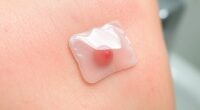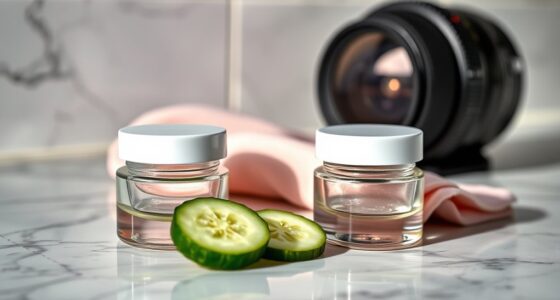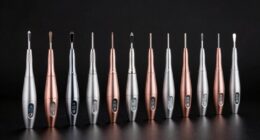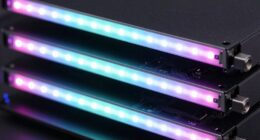Exposure to blue light from screens can harm your skin, causing premature aging and hyperpigmentation. To protect yourself, use broad-spectrum sunscreen and incorporate antioxidant-rich products like vitamin C into your routine. Consider investing in blue light-blocking glasses and screen protectors. Make lifestyle adjustments, such as enabling night mode on your devices and taking regular breaks from screens. By following these tips, you can safeguard your skin and maintain its health. There’s more to discover about this topic ahead.
Key Takeaways
- Apply broad-spectrum sunscreen with zinc oxide or titanium dioxide daily to protect skin from blue light damage.
- Use antioxidant serums like vitamin C and E to combat oxidative stress caused by blue light.
- Implement screen time limits and follow the 20-20-20 rule to reduce blue light exposure.
- Invest in blue light-blocking glasses and screen protectors for added skin protection during device use.
- Choose niacinamide-based moisturizers to strengthen the skin barrier and minimize sensitivity from blue light.
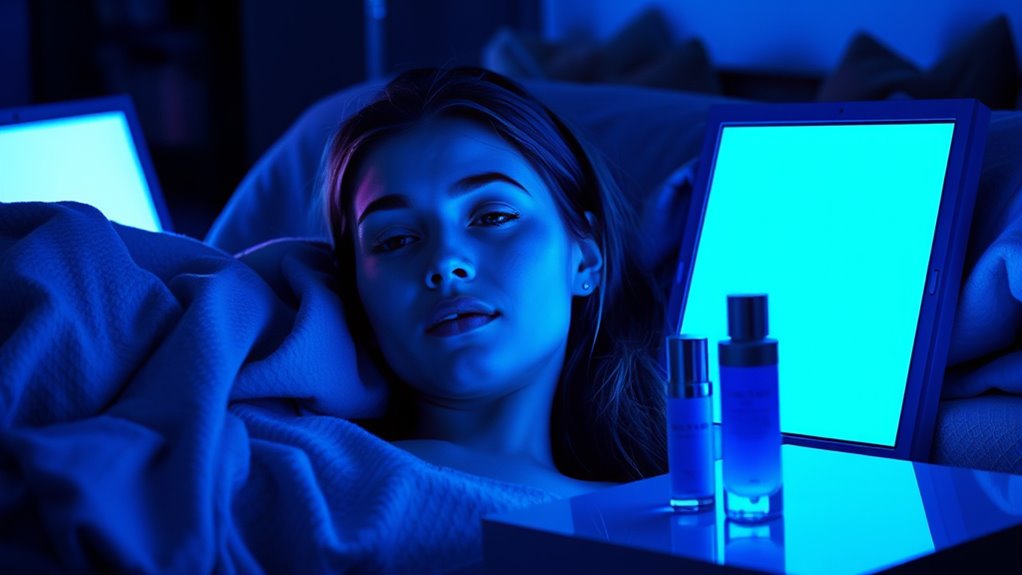
As you spend more time on screens, whether for work or leisure, it’s crucial to recognize the hidden dangers lurking behind those glowing displays. One of the most significant threats is blue light, which spans the visible light spectrum from 400 to 490 nanometers. While it’s naturally emitted by the sun, artificial sources like smartphones, tablets, laptops, and even LED lights also produce it. Prolonged exposure to blue light can wreak havoc on your skin, leading to premature aging and oxidative stress that you mightn’t notice until it’s too late.
Recognize the hidden dangers of blue light from screens, which can lead to premature aging and skin stress.
Blue light penetrates deeper into your skin than UV rays, damaging skin cells, collagen, and elastin fibers. This damage can manifest as hyperpigmentation, where uneven skin tones arise due to stimulated melanocytes. Blue light’s effects on skin can exacerbate these issues, especially for those with existing conditions like acne, rosacea, or eczema. You may also find that your skin barrier becomes disrupted, leading to increased dryness and sensitivity. The beauty industry is increasingly addressing these concerns with innovative products designed to combat blue light damage. It’s essential to consider using carrier oils for additional skin protection and nourishment in your skincare routine. Regular skin treatments can also help in maintaining long-term skin health and vibrancy. If you have conditions like acne, rosacea, or eczema, you might notice that inflammation triggered by blue light can exacerbate these issues. Over time, this cumulative damage contributes to the degradation of collagen and elastin, resulting in visible signs of aging.
To protect your skin, consider using broad-spectrum sunscreens containing zinc oxide or titanium dioxide, which can defend against blue light and UV rays alike. Pair this with antioxidant-rich products, like vitamin C and vitamin E serums, that neutralize free radicals created by blue light exposure. Incorporating niacinamide-based moisturizers can strengthen your skin barrier and help reduce pigmentation issues.
Additionally, investing in blue light-blocking screen protectors for your devices can significantly lower your exposure. You can also make lifestyle adjustments to minimize blue light’s effects. Enable night mode on your devices to reduce blue light emissions and take regular breaks using the 20-20-20 rule—every 20 minutes, look at something 20 feet away for 20 seconds.
Opt for ambient lighting instead of bright LEDs, and limit screen time before bed to improve your sleep quality and skin health. Lastly, consider protective measures like blue light-blocking glasses and tinted sunscreens for added defense. If you notice existing damage, treatments like laser skin therapy or antioxidant-rich products can assist in repairing your skin.
Frequently Asked Questions
What Is Blue Light and How Does It Affect Skin?
Blue light is a high-energy visible light that falls within the 400-500 nanometer range.
You encounter it daily from sources like the sun and digital screens.
While it has potential benefits, such as reducing acne and aiding hair growth, it can also have negative effects on your skin.
Prolonged exposure may lead to skin damage, premature aging, and increased pigmentation.
It’s essential to be mindful of your exposure to protect your skin’s health.
Do Sunglasses Protect Against Blue Light Exposure From Screens?
Sunglasses mainly protect against UV rays, so they aren’t always effective against blue light exposure from screens.
While certain lens tints like yellow or amber can filter some blue light, most standard sunglasses don’t provide comprehensive protection.
If you’re concerned about blue light from your devices, consider investing in specialized blue light glasses designed specifically for screen use.
These can help reduce potential damage to your eyes and skin from extended screen time.
Can Blue Light Cause Skin Aging?
Imagine your skin soaking up the glow from your phone screen like sunlight on a summer day.
Unfortunately, that blue light can lead to skin aging. It penetrates deep, damaging collagen and elastin, which keeps your skin firm and youthful.
Over time, you might notice wrinkles or dark spots forming. So, yes, blue light can accelerate aging, and it’s essential to take steps to protect your skin from its harsh effects.
How Can Diet Influence Skin Protection From Blue Light?
Your diet can significantly influence your skin’s protection against environmental stressors. By incorporating antioxidant-rich foods like berries, leafy greens, and nuts, you help neutralize harmful free radicals.
Vitamins C and E, found in fruits and seeds, boost collagen production and hydration, enhancing skin resilience. Omega-3 fatty acids from fish reduce inflammation, while staying hydrated keeps your skin elastic.
Balancing these nutrients promotes healthier skin and fortifies it against potential damage.
Are There Specific Skincare Products for Blue Light Protection?
Yes, there are specific skincare products designed for blue light protection.
You can look for antioxidant-rich serums that include ingredients like Vitamin C, ginseng, and malachite, which combat oxidative stress.
Additionally, consider using sunscreens with iron oxides or titanium dioxide to shield your skin.
Blue light protection sprays are also available, providing a quick defense without disrupting your makeup.
Incorporating these products into your routine can help maintain healthy, youthful skin.
Conclusion
In a world where screens dominate our lives, protecting your skin from blue light isn’t just important—it’s essential! You wouldn’t let a thousand suns blast your face, so why let screens do the same? By incorporating simple steps like using protective skincare and limiting screen time, you can keep your skin glowing and healthy. So, take charge and shield your skin from those invisible rays; it’s your best defense against premature aging!

